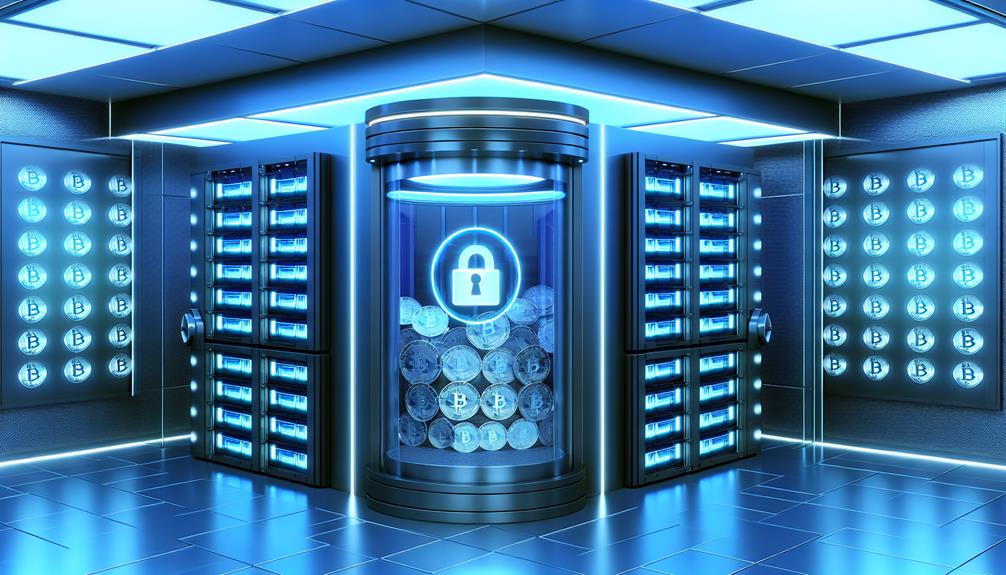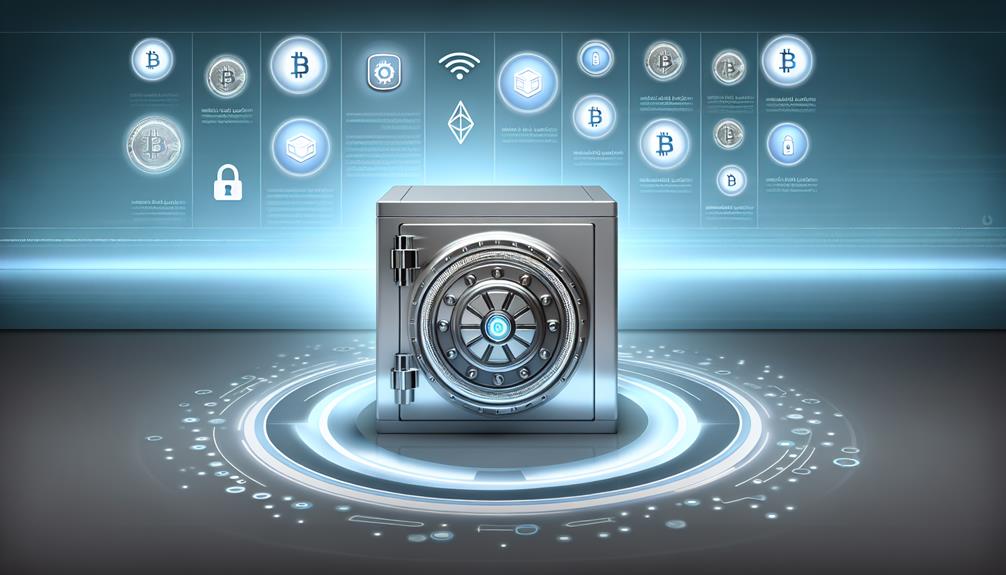You might be surprised to learn that not all crypto exchanges take the same approach to securing digital assets. While many offer online wallets, the ones that prioritize safety often store a large percentage of their holdings in cold storage. This practice can greatly reduce the risk of hacks, but which exchanges are truly committed to this method? Exploring the nuances of cold storage practices among leading platforms might reveal more than you expect about their security measures and how they protect your investments.
Understanding Cold Storage
Cold storage is an essential component of cryptocurrency security, with over 90% of digital assets on exchanges typically held in this manner. This method involves storing private keys offline, greatly reducing the risk of hacks or unauthorized access. When you use cold storage, you're taking a proactive approach to asset protection, guaranteeing that your crypto wallets are less vulnerable to online threats.
Cold storage can manifest in several forms, including hardware wallets, paper wallets, and even air-gapped computers. Each of these options provides distinct layers of security, allowing you to choose a method that best aligns with your risk tolerance and accessibility needs. For instance, hardware wallets store your private keys in a physical device, making it nearly impossible for hackers to access them remotely.
Understanding the nuances of cold storage is vital for anyone looking to secure their cryptocurrencies effectively. By removing your private keys from the internet, you minimize exposure to phishing attacks and malware, which are prevalent in the crypto space. However, it's essential to recognize that cold storage isn't without its challenges; you'll need to manage the physical security of your storage method and verify you have reliable backup strategies in place.
Benefits of Cold Storage
Many investors recognize the substantial benefits of utilizing cold storage for their cryptocurrency holdings. This method of storing digital assets offline notably reduces the risks associated with online storage, especially in light of the increasing number of cyberattacks targeting exchanges and wallets. By opting for cold storage, you can enhance the security of your investments while enjoying several additional advantages.
Here are three key cold storage benefits:
- Protection Against Hacks: Since cold storage keeps your assets offline, it becomes virtually impossible for hackers to access your funds. This enhanced security measures guarantee that even if your online accounts are compromised, your cryptocurrency remains safe.
- Control Over Private Keys: When you store your crypto in cold storage, you maintain full control over your private keys. This autonomy means you won't have to rely on third-party services that could potentially mishandle your assets or fall victim to cyber threats.
- Long-Term Storage Solution: Cold storage is ideal for investors looking to hold their cryptocurrency for extended periods. By keeping your assets offline, you can avoid the temptation of frequent trading and reduce the risk of emotional decision-making during market fluctuations.
Leading Crypto Exchanges

When exploring the landscape of cryptocurrency trading, understanding the leading exchanges is crucial for making informed investment decisions. The major players in this space, such as Binance, Coinbase, and Kraken, offer varying features that can notably impact your trading experience. One critical aspect to evaluate is exchange liquidity. High liquidity guarantees that you can buy or sell assets quickly, often at better prices, which is essential during market volatility. Leading exchanges typically have a larger user base, contributing to enhanced liquidity and allowing for smoother transactions.
Another important factor to assess is trading fees. Different exchanges have different fee structures that can affect your overall profitability. Some platforms charge a flat fee per trade, while others utilize a tiered system based on your trading volume. For instance, Binance is known for its low trading fees compared to competitors like Coinbase, which charges higher fees for a more user-friendly interface.
Additionally, you should also contemplate the types of assets available for trading. Leading exchanges often provide a wide variety of cryptocurrencies, which allows for greater diversification of your investment portfolio. This diversity not only enables you to capitalize on various market trends but also helps in managing risk effectively.
Cold Storage Practices
When considering cold storage practices, it's vital to understand the various types available and the security measures that underpin them. Different methods, such as hardware wallets and paper wallets, offer unique advantages and vulnerabilities. Implementing robust security protocols is important for safeguarding assets against potential threats, so you'll need to evaluate each option carefully.
Types of Cold Storage
Understanding the various types of cold storage is essential for anyone looking to safeguard their cryptocurrency assets. Cold storage methods are significant for protecting your private keys from online threats. Here are three primary types of cold storage solutions you should consider:
- Hardware Wallets: These are physical devices specifically designed to store your private keys offline. They provide a secure environment, protecting against malware and hacking attempts.
- Paper Wallets: A paper wallet is a physical document containing your private and public keys. It's generated offline, often through a secure website, and can be printed out. However, it's important to keep this document safe from physical damage or theft.
- Multi-Signature Solutions: This method requires multiple private keys to authorize a transaction, enhancing security. You can store these keys across different locations or devices, ensuring that a single point of failure doesn't compromise your assets.
Many users also consider custodial services, which manage cold storage on your behalf. While convenient, using custodial services means putting trust in a third party, which can introduce additional risks. Choose wisely based on your risk tolerance and security needs.
Security Measures Implemented
Implementing robust security measures is critical for effective cold storage practices in cryptocurrency management. Exchanges must adopt thorough security protocols to safeguard their assets from potential threats. A risk assessment framework plays an essential role in this process, helping identify vulnerabilities and mitigate risks associated with cold storage solutions.
Here's a breakdown of common security measures:
| Security Measure | Description | Purpose |
|---|---|---|
| Multi-Signature Wallets | Requires multiple keys for transactions | Enhances security against theft |
| Hardware Security Modules | Specialized devices for storing keys | Protects against unauthorized access |
| Air-Gapped Systems | Offline storage systems | Reduces exposure to cyber threats |
| Regular Audits | Periodic checks of security protocols | Guarantees compliance and updates |
| Employee Training | Educating staff on security practices | Minimizes human error |
Security Features Comparison

Often, the effectiveness of cold storage solutions for cryptocurrencies hinges on a variety of security features that differ considerably across exchanges. Understanding these features is essential for safeguarding your assets against potential threats. Here's a comparative analysis of vital security components you should consider:
- Hot Wallets vs. Cold Wallets: While hot wallets are convenient for quick access and transactions, they expose you to greater risk due to their online nature. In contrast, cold wallets are offline, greatly reducing the possibility of hacks. Look for exchanges that prioritize cold storage solutions for the bulk of their assets.
- Multi Signature Wallets: These wallets require multiple private keys to authorize a transaction, enhancing security. If an exchange employs multi signature technology, it means that even if one key is compromised, the funds remain secure, requiring additional verification from other parties. This adds a robust layer of defense against unauthorized access.
- Physical Security Measures: Beyond digital encryption, physical security is essential. Some exchanges utilize secure facilities with biometric access controls, surveillance, and armed security guards for their cold storage. Investigate whether the exchange you're considering has stringent physical security protocols to protect their assets.
Choosing the Right Exchange
Selecting the right cryptocurrency exchange is essential for guaranteeing the security and accessibility of your assets. When reviewing exchanges, start by evaluating their exchange reputation. A well-established reputation often correlates with a history of secure transactions and reliable service. Look for user reviews that provide insights into the experiences of other traders; these can highlight potential pitfalls or advantages.
Next, consider the trading fees associated with each exchange. High fees can erode your profits, so it's important to find a balance between cost and the services offered. Additionally, evaluate the asset variety available on the platform. A broader selection allows you to diversify your investments, but make sure the exchange supports the specific cryptocurrencies you're interested in.
Another critical factor is customer support. An exchange with responsive and knowledgeable support can make a significant difference, especially in cases of transaction issues or security concerns. Don't forget to check the withdrawal limits, as these can impact your ability to access your funds when needed.
Lastly, examine the platform usability and regulatory compliance. A user-friendly interface enhances your trading experience, while adherence to regulations ensures that the exchange operates within legal frameworks, adding an extra layer of security. By weighing these factors carefully, you can make an informed decision that aligns with your trading goals and risk tolerance.
Frequently Asked Questions
What Types of Cryptocurrencies Are Stored in Cold Storage?
When considering cold storage, you'll find Bitcoin, Ethereum, and stablecoins commonly stored due to their liquidity. Cold storage benefits include enhanced cryptocurrency security, effectively minimizing risks like hacking, thereby safeguarding your assets from potential threats.
How Often Do Exchanges Update Their Cold Storage Security Measures?
You'd think cold storage security's set in stone, but exchanges often conduct cold storage audits and implement security upgrades regularly. It's a dynamic process aimed at staying ahead of emerging threats in the crypto landscape.
Can Users Access Their Funds in Cold Storage Immediately?
You can't access your funds in cold storage immediately. The fund retrieval process typically involves security protocols, which can delay accessibility. Understanding cold storage accessibility is essential for managing your cryptocurrency investments efficiently.
What Happens if an Exchange Goes Bankrupt With Cold Storage Assets?
If an exchange goes bankrupt, bankruptcy implications could hinder asset recovery. You might face delays or losses, as funds in cold storage may be locked or inaccessible, complicating the process of reclaiming your assets.
Are There Fees Associated With Withdrawing From Cold Storage?
Did you know over 60% of cryptocurrency exchanges impose cold storage fees? When you initiate withdrawal processes, be aware that these fees can vary considerably, impacting your overall transaction costs and investment strategy.
Conclusion
In the ever-evolving landscape of cryptocurrency, securing your assets is akin to safeguarding a treasure chest in a digital pirate-infested sea. By opting for exchanges that prioritize cold storage, you're investing in a fortress against potential threats. Exchanges like Binance, Coinbase, and Kraken exemplify this protective measure, ensuring your funds remain safe from prying eyes. As you navigate your options, remember that a secure exchange can be your greatest ally in the quest for financial freedom.
